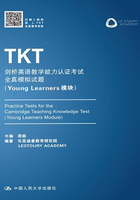
Ways of adapting materials
A personalising the content
B adding visual support
C adapting tasks
D adding word banks
E omitting unnecessary detail
F adding possible answers
G changing layout
H simplifying language
Teachers' problems
21 The story contains a lot of unfamiliar names of animals. Pupils don't need to learn the names, but they might find so many new words a distraction.
22 The questions are quite challenging, so I'd like to give students choices to help answer them.
23 Pupils just have to write the answers on their own. I'd rather they had more oral practice.
24 The story is set in a school in an English-speaking country. I'm not sure my students can relate to some of the events in the story, and to some of the pictures.
25 There's too much text on each screen. It looks intimidating. I wish it could be in more bite-sized chunks.
26 I found some tourist brochures which have great pictures, so they're perfect for describing different places. However, they contain a lot of information on how to get there and where to stay, which isn't really relevant.
27 The chapter is quite dry. It's very text-heavy.
For questions 28 – 34, look at the statements about using resources and choose the option (A, B or C) which best completes each statement.
Mark the correct letter (A, B or C) on your answer sheet.
28 I often read stories that contain some of the new words to __________.
A assess students' understanding
B put language in a meaningful context
C help students interact
29 I like to use two puppets to __________.
A demonstrate a dialogue
B introduce target vocabulary
C encourage students
30 Guessing games are an effective way to __________.
A listen for gist
B introduce new lexis
C engage students
31 I sometimes make a video of pairs acting out a conversation, in order to __________.
A give students a goal
B get students warmed up
C develop students' acting skills
32 I do sentence ordering with cards on the whiteboard, because __________.
A it gives students a lot of practice
B all students can see what is correct
C students get easily distracted when they work in groups
33 Students instruct each other to make origami animals, in order to practice __________.
A grammar
B vocabulary
C directions
34 Simple vocabulary quizzes on the PCs are useful, because __________.
A students receive immediate feedback
B computers are fun
C students develop their fluency
For questions 35 – 40, match the teachers' classroom language in the examples with the scaffolding strategies listed A – G.
Mark the correct letter (A – G) on your answer sheet.
There is one extra option which you do not need to use.